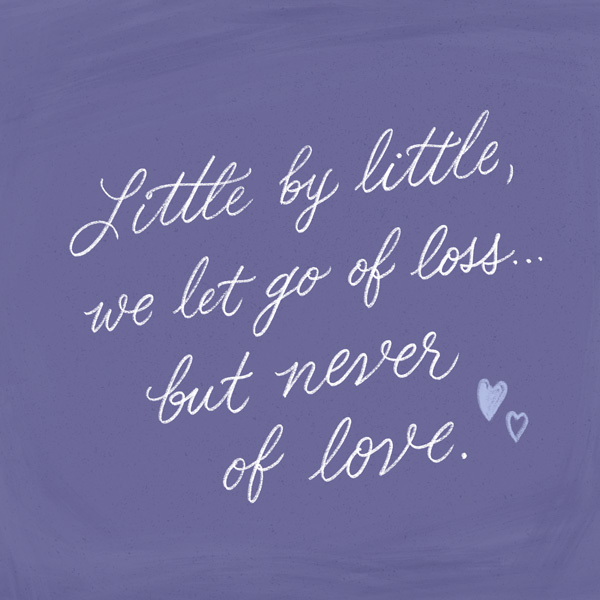Managing grief and loss isn’t something easy to talk about. When the funeral services are done and life goes on after a heart shattering loss, what happens next? How do you navigate parenting and healing with an irreparable void? How can you be a steadfast role model of moving on for your child when you’re, in fact, emotionally undone?
Four years ago, I became a mother. One and a half years later, I lost my father. Six fleeting months after that, my first ever best friend of half my life followed suit. Not only did I lose them forever, but I got a crash course in dealing with those losses. It was a shift in my entire paradigm. The tears would come out of nowhere; they still do. Whether while driving to story time, noticing a familiar smell, or just listening to the radio, they’re still on my mind. I miss them, and there are constant reminders of their absence… absolutely everywhere. Managing grief and loss has been a full-time job for me as I know it is for everyone when we close the final chapter with someone special to us.
Navigating Grief
There are three core tactics I’ve learned throughout the course of navigating unexpected loss while trying to raise my children and simultaneously navigate immense grief: understanding the delicate cycle of grief, compartmentalizing pain and emotions, and sharing in my losses.
1. Grief has a Cycle
There are many mechanisms available to help us manage the cycle of grief and loss, but I think they only work after you have truly given yourself to the magnitude of your loss. You might consider the vague advice “be strong,” but I would encourage you not to. No matter how many times grief knocks the wind out of you, and no matter how inescapable it can feel, emotional pain cannot kill you. Go ahead and be weak; let yourself grieve.
Instead of hiding your grief, try to embrace it: let your cheeks get hot, sob uncontrollably, and truly try to feel the magnitude of your loss. There is a space inside you where a shared experience once was, which you’ll never share again. Shut the world out, take the time off, lose your cool, and let it all out. You will find the people around you will hold you up with loving arms.
In order to regain control, you should first lose it. If you are given time, please consider taking it. When people arrive to you with homemade dinner in an attempt to lessen your load, please try to stomach it. If a friend offers to watch your children while you mourn, please let your tears rain down.
Somehow life manages to carry on no matter how badly you pine for it to stop. In due time, you must and will continue with your life. Managing grief is essential; there are bills to be paid and laughs to be had with your children. Things around us keep on going, maybe even with greater momentum than before, and we should try to keep going, too.
There is a delicate balance between your pits of grief, the milestones you’re reaching with your children, and the people no longer around to share in that. It might not always seem like it, but when you’re feeling lower than an ant’s belly, that’s when you’re making the time to do the hardest work in the process.

2. Compartmentalize
After I have found a delicate balance of control, when grief comes I can let it sit in me silently. I can hold myself together and remain mostly composed until I can feel the totality of my loss and emotions away from my child’s eyes. I put it away, and I play with my children. I have personally learned to deal with grief by learning to compartmentalize, not to avoid confronting it but to isolate it until I can give it what it’s asking of me.
One day you’ll be able to explain to your children that their Grandfather died and is not just resting in a treasure chest. But for now, sister, that answer will totally suffice. Put it away until you’re ready to cope and until you’re ready to explain to your children. When you put those boxes away, bring back happy ones instead. Show your children pictures and videos. Tell them stories about your loved one. Don’t keep it away forever…just until you’re ready.
Show them whatever you can to help make your loved ones seem more alive in your household than they were before they even left. Speak their name back into existence and do it as frequently as you can. Celebrate their life with your children but also allow yourself time away from it until you can give it what it’s asking of you. Parenting is hard enough as it is, so take your time with this.
 3. Bereavement Support
3. Bereavement Support
One of the unique things about managing grief is the caliber of people it gives you to share in the process. Everyone around us has gone through losing someone important in his or her life. If they haven’t yet, I’m sad to confirm that someday they will. That is the eventuality of life after all. You might have to do all the pick-ups and drop-offs, the unaccompanied 9 a.m. to 5 p.m.s, and most of the house work all alone, but you don’t have to do this hard work alone. Sharing your grief and loss will help you manage it. It helps to listen even if you don’t want to talk.
Sometimes bereavement groups and grief counselors are helpful in the pursuit of less complicated grief. Personally, I have a group chat with my two best friends. In it you can find stories of our children, vague wishes of men to clean up after themselves, and miles upon miles of texts of us trying our best to sort out the gross vegetables of grief and loss.
I’ve learned, though, if we focused solely on those gross vegetables, we would would miss out on the people pulling up a chair to our table. You would miss out on the people around you who are eager to have their empty cup filled, and you would miss out on the people equally eager to fill up yours.
Things will never be the same; it’s a new life with a built-in kind of sadness. But believe it or not, you will find people who share in your grief and loss, and eventually won’t feel so lonely.
:max_bytes(150000):strip_icc()/GRIEF_SUPPORT02-56a2754c5f9b58b7d0cac43f.jpg)
It’s Going To Last Forever
Managing grief is going to last forever. They don’t always flat out say that to you, but it’s true. That’s reality. It will always hurt because you’re missing someone special, and there will always be an irreparable void. These three core tactics can take you through the dinner course, help you find the table, even guide a friend to pull up a chair and sit with you, but they will never serve you dessert. These concepts will take you to the kitchen, but you have to serve yourself. You have to do the work.
Embracing death and coping with grief is a part of embracing parenthood. Once you come full circle in life, you have an intense and valuable understanding of the ultimate picture. It doesn’t get better since grief is not linear; it ebbs, and it flows. Eventually, you learn to manage the process alongside the people who love you.












